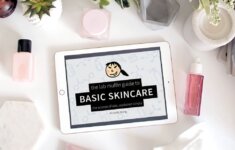If you walk into a pharmacie in France, you’ll immediately bump into a giant display of thermal water spray cans. A whole host of French skin care brands like Avène, La Roche-Posay, Uriage and Vichy sell thermal water sprays. What is it, what’s in it, what does it do and how is it different from regular water?
What is thermal water?
Thermal water comes from hot springs. The water in these hot springs come from deep in the ground, where it’s heated by geothermal activity (the Earth’s natural heat which also causes lava to be molten).
What’s in thermal water?
It’s mostly water, of course, but it isn’t “just water in a can”! As the thermal water rises to reach the spring, it passes through rocks and soil which dissolve to add minerals to the water. The mineral content of a particular thermal water depends on where it comes from. The minerals include the ones found in your skin’s natural moisturising factor (NMF), like chlorides, sodium, potassium, calcium, and magnesium.
Here are the compositions of the 4 most popular thermal waters (source: Bacle et al., Int J Dermatol 1999, brand marketing materials). There’s some variation between batches of course, since it’s a natural mixture.
| Composition (mg/L or ppm) | Avène | La Roche-Posay | Vichy | Uriage |
|---|---|---|---|---|
| Total dry residue | 207 | 444 | 5120 | 11000 |
| Sodium | 4.8 | 10 | 1860 | 2360 |
| Potassium | 0.7 | 2.2 | 99.6 | 45.5 |
| Calcium | 42.7 | 140 | 150.6 | 600 |
| Magnesium | 21.2 | 4.9 | 12.3 | 125 |
| Chlorides | 5.4 | 25 | 357 | 3500 |
| Bicarbonates | 226.7 | 396 | 4776.3 | 402 |
| Sulfates | 14 | 30 | Trace | 2862 |
| Nitrates | 1.4 | Trace | Trace | |
| Silica (SiO2) | 10.6 | 30 | - | 42 |
| Selenium | - | 0.060 | - | - |
| Strontium | - | 0.260 | - | - |
| Zinc | - | 0.022 | - | 0.16 |
| Copper | - | 0.005 | - | 0.075 |
| Manganese | - | - | - | 0.154 |
| Iron | - | - | - | 0.015 |
| pH | 7.4 | 6.9 | 7.00 | 6.77 |
As you can see, the composition varies a fair bit, with Uriage, the thermal water with the highest mineral content, being 55 times more concentrated than Avène, which has the lowest mineral content.

“-” in the table means no data, since different thermal water brands like to highlight different aspects of their water. La Roche-Posay talks a lot about the selenium content of their water, while Uriage emphasises the high calcium concentration. Avène talks a lot about the 2:1 ratio of calcium and magnesium in their water.
There’s also nitrogen gas inside the can that acts as a propellant, to push the water out as a spray. Paula’s Choice writes that the nitrogen “can generate free-radical damage and cause cell death”, which luckily isn’t true, since nitrogen gas (N2) make up 78% of the air we breathe! It’s actually very unreactive, so unreactive that it’s commonly used in laboratories to flush out more reactive things like oxygen and water. (The papers cited in the Beautypedia article actually involve chemicals that just contain nitrogen atoms, not nitrogen gas itself.)
What does thermal water do for skin?
There are a handful of peer-reviewed studies that show that thermal waters have beneficial effects. Unfortunately, almost all of them are performed by the companies themselves, and naturally they show that their product is better than the others, so they should be taken with a grain of salt. (It’s kind of unavoidable though – independent scientists aren’t going to get funding for studying water when there’s cancer to be cured and climate change to undo.) The two best-studied thermal waters are Avène and La Roche-Posay. While this doesn’t necessarily mean that their products are better, it does mean that their effects are more substantiated, for now.
A lot of the studies are also in vitro, which means they’ve put bare cells or tissues in thermal water and watched the effects. These studies are good for seeing how a product works, if it works – but they’re not so good at telling you if it works in then first place. Humans are much more complex than a handful of cells in a petri dish.
With these caveats in mind, here’s what the studies say thermal water can do:
Protect from UV damage
La Roche-Posay, Uriage and Avène thermal waters have been found to protect cells from UV-related damage in vitro. Additionally, mice treated with a cream containing La Roche-Posay developed tumours slower than control groups after UVB exposure. A La Roche-Posay thermal water cream also reduced the formation of sunburn cells in human volunteers after UVB exposure.
It’s been speculated that selenium, zinc and/or copper are responsible for this effect, since they’re important for the functioning of antioxidant enzymes naturally in the skin, which soak up the damaging free radicals produced by UV light.
Decrease inflammation
Thermal water is commonly used for a lot of conditions related to inflammation, including atopic dermatitis (eczema), psoriasis, and ichthyosis.
In vitro, Uriage, La Roche-Posay and Avène water decreased the production of inflammation-causing chemicals by skin cells. A study with human volunteers found that a La Roche-Posay thermal water gel decreased irritation caused by sodium lauryl sulfate.
A clinical trial found that Avène reduces the severity of atopic dermatitis (eczema) when added to a cream, and decreased the amount of inflammation-causing bacteria on the skin. Avene also reduced the severe peeling that’s usually a side effect of using tretinoin as an acne treatment. La Roche-Posay also managed to help 50% of a clinical trial group suffering from psoriasis, although that study involved drinking the water as well as applying it on the skin.
You’d expect that a higher mineral content might work better, but interestingly, comfort, softness and suppleness are better with a lower mineral content, and irritation is lowest (it’s worth noting though, that this particular study was performed by the parent company of Avène, the lowest mineral content water).
References
S Seite, Thermal waters as cosmeceuticals: La Roche-Posay thermal spring water example, Clin Cosmet Investig Dermatol 2013, 6, 23–28.
C Merial-Kieny, N Castex-Rizzi, B Selas, S Mery & D Guerrero, Avène Thermal Spring Water: an active component with specific properties, J Eur Acad Dermatol Venereol 2011, 25 Suppl 1:2–5.
I Bacle, S Meges, C Lauze, P Macleod & P Dupuy, Sensory analysis of four medical spa spring waters containing various mineral concentrations, Int J Dermatol 1999, 38, 784–6.
F Beauvais, JL Garcia-Mace & F Joly, In vitro effects of Uriage spring water on the apoptosis of human eosinophils, Fundam Clin Pharmacol 1998, 12, 446–50.
Thermal waters from Avène and Uriage were press samples, which did not affect my opinion. For more information, see Disclosure Policy.







Very interesting, thanks! Are the minerals in these thermal water beauty products significantly different from what you would find in mineral waters that are bottled for drinking? I assume the later aren’t “thermal” but I’m curious how they compare.
Some of them are thermal, actually! You can buy Vichy water as drinking water for example. The composition really depends on where the mineral water is from – in general though, mineral water for drinking has lower amounts of all the minerals, since high amounts taste weird (Evian has 330 mg/L dry residue, for example, and to me that already tastes pretty weird).
Would you say that some mineral waters (for drinking) would have the same benefit to the skin?
I would think so! There’s a lot of variation in the sprays tested, so I think most mineral waters will have some similar benefits. I think the fine mist that comes from the aerosol can would be hard to replicate with a homemade pump can, but that’s only really an issue if your make-up isn’t waterproof!
I LOVE Uriage and everything they make. Their products are amazing! Have you tried the Thermal Micellar Wipes?! They are the best thing that has ever happened to me (skin care wise haha).
Great post! Very informative!
Tahana <3
http://tahanalee.blogspot.com.au/
Not yet – they sound really handy!
I have read somewhere…skincareaddiction maybe? That those waters actually dehydrate your skin because the evaporate with the moisture of it? I’m not sure it is true…can you tell me?
Water can make your skin leakier, both inwards and outwards, so water can leave more easily. These are meant to be used with moisturisers though, to prevent this from happening!
Ah yes ! This article was really helpful and I was wondering about this point. I see the benefit of using before a moisturizer. What I’ve been wondering is, if it would be dehydrating as a setting spray for mineral makeup powder? I don’t want to use a setting spray as I’m trying to rule out irritants and don’t need anything for longevity. Just want a slight dew and to bring down the powder look without doing any harm 🙂
Cleanse…dry…spray avene water…moisturize
Or cleanse…don’t dry, spray avene…moisturizer?
Ah, the little details get me every time!!! Thanks again.
I have a free sample can of Uriage and personally I just use it as any other spray, to uncake makeup for example. Idk, I’m a skeptic haha.
I usually use it to mist my face before moisturiser – it’s really good for dehydration! I think plain water would work too – maybe not quite as well, but for my purposes water is the main thing.
This was really informative and interesting, thank you! I don’t think I’ve ever heard of thermal water before. I’m curious to know if there’s easily available at the drug stores here in the states. I remember when those Evian water sprays were very popular, and that was literally just water haha. I’d love to read more about these thermal waters though.
They are but they’re expensive! They’re a lot cheaper in France, so I think the price is a “luxury foreign product” kind of tax. You can try spraying mineral water on your face though – a lot of mineral waters have lists of the minerals they contain!
I was wondering if you could expand on the pH of these thermal spring waters. I’ve heard that just regular water, if sprayed and left to dry without the use of any moisturizer, will disrupt the skin and dehydrate it more (or something along the lines of; I’m a bit fuzzy on the particulars right now). How does thermal water fair in that regard? Will it still dehydrate the skin if moisturizer is not applied? Or would the mineral content have some effect and reduce dryness/unbalanced pH?
Thanks!
The drying effect isn’t related to pH – thermal water and regular water are pretty similar in pH. The difference is the mineral content. While normal water disrupts the membranes and increases evaporation without adding any benefit, the minerals in the thermal water actually grab onto water and reduce evaporation.
I have the vichy thermal water! still not 100% what it does.
Hi Michelle, nice article! I recently bought Avene thermal water and my skin feels tight after I spray it on my face after cleansing. I also developed small rashes on my cheeks. Is there any reason why this would happen? Thank you!
Interesting! I think the tight feeling could just be the salts drying on your skin. The rashes are a bit worrying though – have you tried spraying only one side of your face to see if the rashes are definitely related to the thermal water?
Extremely fascinating, much appreciated! more blogs like this please!
maybe this is a dumb question, but how is hard water different? People say the minerals in hard water are harmful for the skin and to get a filter.
Hard water mostly contains calcium and magnesium, but can contain different minerals depending on where it’s from. It’s mostly the balance of minerals that makes the difference!
Hey,
I’ve learned a lot from this article. I am thinking of using thermal water everyday than my regular water.
Hi Michelle! I read through both your post and the comments but can’t come to a conclusion for myself about using thermal spray water for adding hydration during the day. I understand that it is best to use them before moisturisers, but I’d like to freshen up and somewhat re-hydrate my skin during the day, can I just spray thermal water on top and let it air dry, or will it backlash? Thank you so much in advance!!
That should be fine! I do that too 🙂
For what it’s worth, here’s the composition details (mg/L) from my Evian Mineral Water Spray:
Sodium – 6.5
Potassium – 1
Calcium – 80
Magnesium – 26
Chlorides – 6.8
Bicarbonates – 360
Sulfates – 12.6
Nitrates – 3.7
Silica – 15
pH = 7.2
Doesn’t give any indication of total dry residue. Seems to fit between the Avene and LRP though 🙂
I love how anti-bullshit you are! My favourite beauty blog for sure.
yes, that is why we all love her to the moon and back 😉
Thermal water is great for our bodies, thanks for providing such a relevant information. It made me take care more of my skin.
Hi,
I have oily acne prone skin. I am keen to use thermal water after cleansing without a moisturizer at night as I moisturise in the morning.
I read that La Roche Posay thermal spring water can be used in place of a toner. Please confirm.Will using thermal water dehydrate my skin as per your previous post? I do not use a moisturizer at night as I am not keen to moisturise twice as it hasnt worked in the past for me.
Thanks a ton
For Rosacea kind of skincare, I would suggest you try dermalmd rosacea serum, I have been going thru terrible red worse acne on my face I had tried one of the kind lotions and not anything regarded to work but I determined to give rosacea serum dermalmd try after seeing some of the images and reviews. Wow! I was amazed after the primary time. It reduced the swelling and the redness almost disappeared.
Hi Michelle,
I’m just interested, the jons in thermal water like potassium, sodium etc. are normally the part of NMF, manufacturers declare moisturizing effect. but how these jons from water can moisturize skin if they don’t penetrate stratum corneum?
They don’t need to penetrate the stratum corneum to have a moisturising effect. When you’re moisturising, you’re really only moisturising the stratum corneum – the living cells below are protected enough that they don’t need extra water.
Can this be used after a Vitamin C serum?
i use the lrp thermal spray before i add a hydrating serum or moisturizer. Just too keep from seeing out between steps. i wouldn’t let it dry on my face. If i need a quick refresher, id reach for a spray that had some hydrators in it like the Glow Recipe. My 2 cents!
Hello. I have recently bought Avene thermal spring water spray and when I applied it yesterday something happened. It is actually hard to describe but around my mouth and in my throat I had a weird sensation of numbness (like from anesthetic in a spray) so I started to panic cause I thought I had an allergic reaction even though I knew there is nothing but water in the bottle. Somehow I calmed myself down and after a few minutes (1-2) the feeling started to go away. I used it again this evening: first I shook it really hard (thinking that that could be the reason for my weird experience) and then sprayed on my face while trying not to breathe and even waited a while until I took another breath and it happened again – mouth and throat again were numb… I wanted to ask you can this be due to nitrogen and do you think I need to be worried haha? Thank you…
That shouldn’t be because of nitrogen – regular air is already 78% nitrogen!
Yes, I read what you have written in the article. I also gave this to my mom to try it and she didn’t have any issues, but I also think that my experience is not something to be dismissed (even if I am maybe one out of 10 000 people who have had this kind of reaction), so I am thinking about reporting it to the company (because of all the other people that could potentially react the same way).
About nitrogen, I also found a study that says: „The incidence of allergic asthma has risen steadily over the last 20 years and now represents a significant health and financial burden. Reasons for this rise remain unclear, but increases in ambient pollutant levels, such as the oxidant, nitrogen dioxide (NO2),3 correlate with the increased incidence of allergic sensitization, asthma, and wheeze (1, 2). NO2 is a toxic-free radical gas that is a component of air pollution (1, 3) and is also formed in the lung during inflammation (4). NO2 has been implicated in the aggravation of asthma, particularly in children (1, 5–8). We and others have demonstrated that NO2 inhalation is injurious to the lung and can augment the degree of allergic airway inflammation and prolong allergen-induced airway hyperresponsiveness in rodent models of asthma (9, 10).”
I don’t have knowledge of chemistry, I don’t know does Avene use NO2 or pure N or some other compound that contains N or how any one of those could affect the human body, but it seems to me that there could be potential risk for people with respiratory problems (I don’t have asthma but I do have allergic rhinitis and was prescribed with a pump for it), and my experience (which is only based on my subjective perception) is that it really affected only inside parts of my body – not the skin, but the mucosa (is that the word?) of my mouth, upper and lower parts of the throat, and nose… Of course, feel free to dismiss my opinions since, as I mentioned, I don’t have knowledge from chemistry or medicine and I only read the conclusion of the mentioned study (I am not familiar with the metalanguage of the field and hence couldn’t really understand the elaboration part of the paper). Also, it is not my intention to say anything bad about the brand (I do use various products from Avene and I have never had bad experiences until now) or to cause panic among the users of this particular product, just wanted to hear your thoughts since I follow you on YT and know you’re an expert and also hear are there other people with similar experiences…. Also, it might not be the nitrogen but something else that caused my sensations… Best regards.
NO2 (nitrogen dioxide) and N2 (nitrogen) are very very different – N2 is practically inert and we comfortably breathe it in 78% of air, while NO2 is an acidic pollutant and will make you cough and choke at a super low percentage (it turns into nitric acid when it hits moisture). Spray cans have N2, not NO2, and the concentration of N2 in the spray can would be less than the concentration in regular air!